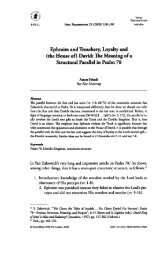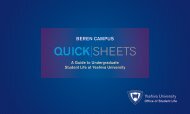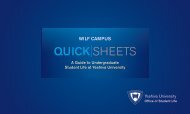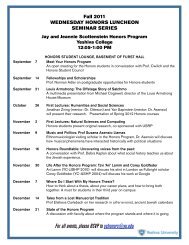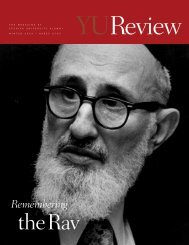Richard Steiner, Kol Nidre - Yeshiva University Blogs
Richard Steiner, Kol Nidre - Yeshiva University Blogs
Richard Steiner, Kol Nidre - Yeshiva University Blogs
Create successful ePaper yourself
Turn your PDF publications into a flip-book with our unique Google optimized e-Paper software.
<strong>Kol</strong> <strong>Nidre</strong>: Past, Present and Future23ור"ת הגיה במחזורים: מיום הכפורים זה עד יום הכפורים הבאעלינו. ולא כמו שהיה כתוב במחזורים מיום הכפורים שעבר עד יוםהכפורים זה... וגם י"ל ודי נַדְ רְ נָא ודי משתבענא דהיינו מה שאניעתיד לידור ולישבע.Rabbenu Tam corrected the maḥzorim (to read) “from thisYom Kippur to (next) Yom Kippur, coming upon us” andnot as had (previously) been written in the maḥzorim“from last Yom Kippur to this Yom Kippur.”... And oneshould also say נַדְ רְ נָא ודי משתבענא ,ודי i.e., that which Ishall vow and swear.The vocalization of נַדְ רְ נָא 80 is faulty but significant nevertheless,because משתבענא is left unvocalized. The contrast seems to reflect arecognition that משתבענא can only be a participle, while נדרנא can be aparticiple or perfect depending on its vocalization.Tosafot:מתוך שמעתין מוחק ר"ת מה שכתב (צ"ל שכתוב) במחזורים בכלנדרי מיום הכיפורים שעבר עד יום הכפורים הבא עלינו לטובהלכך נראה לי [כך!] להגיה מיום הכיפורים זה עד יום הכיפוריםהבא עלינו לטובה ונדרי' של שנה הבא [כך!] הוא דשרי'.... והאדאמר בכל נדרי דנדרנ' דמשמע לשעבר אלמ' דמשמע דאנן מתיריןשעברו, י"ל דנדרנא משמע שתי לשונות ... משמע להבא ולשעבר....81Based on our talmudic discussion, Rabbenu Tam expungesthat which is written in <strong>Kol</strong> <strong>Nidre</strong> in the maḥzorim, i.e.,“from last Yom Kippur to (this) Yom Kippur coming (wepray) favorably upon us” ... Accordingly, it seems proper tome to correct (it to read) “from this Yom Kippur to (next)Yom Kippur, coming (we pray) favorably upon us,”(according to which) it is the vows of the following yearthat we are releasing.... And as for the fact that one saysin <strong>Kol</strong> <strong>Nidre</strong> referring to the past, thereby implying דנדרנא7979R. Asher b. Jehiel, תוספות הרא "ס (ed. Betsalel Deblitsky;.פד col. Jerusalem: Mossad ha-Rav Kook, 2004),80According to the edition (col. ,פד n. 34), the vocalization is in themanuscript.81s.v. (Ned. 23b 203 , "ש"ש על השמסכת נדרים עם פירוש רשי ותוספות ורבינו ניסים והרא.(ואתhttp://www.biu.ac.il/JS/JSIJ/12-2013/<strong>Steiner</strong>.pdf



